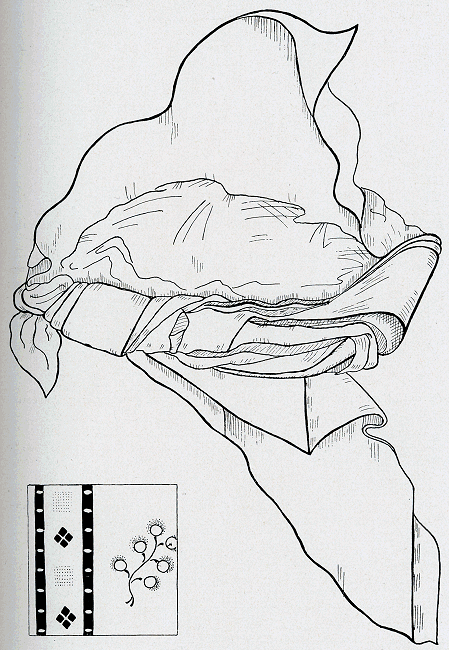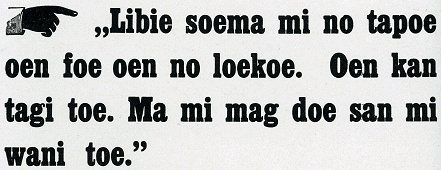Suriname folk-lore
(1936)–Melville J. Herskovits, Frances S. Herskovits–6. ‘Mati’ and the ‘Birthday Party’There is yet another aspect of social ceremonialism which is wholly in the hands of women. Like the lɔbi sɩ̨ngi it has no religious implications, and like the lɔbi sɩ̨ngi, it is imbedded in the emotions which arise out of experiences connected with certain phases of sex life. The ceremonial which we are about to discuss, the ‘birthday party,’ is often associated with the institution of mati, a term which literally translatable as ‘friends,’ is in a specialised sense applied to the two persons who form a homosexual relationship.Ga naar voetnoot1 This ceremonial is also found in association with normal relationships between men and women, where it affords an evening's entertainment, and carries with it the prestige of display through expenditure and the dramatisation of the existence of close emotional ties between the person who celebrates and the one whose birthday is celebrated. Except where women mati are concerned, ‘birthday parties’ are given only for young people; in the mati relationship a party is given most generally for the younger member of a homosexual pair of women. It must not be understood that homosexuality is confined to women. Relationships of this type exist also among men, and in taki-taki are to be found words which are specific designations for male homosexuals, who are termed hantimąn, or awɛge. But the ‘birthday parties’ are associated in the thinking of the Paramaribo Negroes primarily with the attachments between pairs of women, which, due to the disproportionate ratio of women to men, exceed in number those which occur between men. These festivities open during the late afternoon, and if there is dancing, continue through the night. If there is no dancing, they break up about midnight. For fine ‘birthday parties’ several pieces of music are engaged, these being of the same non-religious types of instruments used for the lɔbi sɩ̨ngi. As in all secular dancing, the rattle and the drums made of hollowed logs are not employed. When there is no orchestra, there can, however, still be dancing to the accompaniment of singing and hand-clapping. It is customary for the special ‘friend’ of the person who is celebrating her birthday to come late, and to bring flowers for her mati. These she carries on her head, and, as she approaches the door of her friend's cabin, she stops some paces away, and calls out, ‘Mɩs-mɩsi, mi ką kɔ̨ na ɩni? Nową doti no dɛ na pasi? Nową maka? Nową sɩneki? Nową stɔrɩm | |
[pagina 33]
| |
no sɑ wai̯ mi fadǫn? - Miss-missi, may I come in? Is there no dirt on the path? No thorns? No snakes? No storm to blow me over?’ The answer comes from her friend, who dances toward her, ‘No, no, mɩsi, yu ką kɔ̨ dɔro. - No, no, Miss, you can come in.’ The first asks again, ‘Nąŋga baka? - Backwards?’ ‘Ya. - Yes.’ ‘Nąŋga fesi? - Forward?’ ‘Ya. - Yes.’ ‘Nąŋga sei̯? Fa mi ʾɛ kąnti dɛ, mi no sɑ fadǫn? - Sideways? As I lean over, I won't fall down?’ ‘No, yu no sɑ fadǫn. - No, yon won't fall down.’ This colloquy is accompanied by dancing steps, with the participants moving toward each other and away from each other. When the last phrase has been spoken, the woman whose birthday is being celebrated brings wine to steady the visitor, who is still outside the door. The music begins to play, and the people who are gathered shout, ‘Hɩp, hɩp, hura! Sopi no dɛ, ma kuku dɛ. - Hip, hip, hooray! There is no rum, but there are cakes.’ A chorus of laughter is heard. Some one in the audience calls out, ‘Ɛf' sopi no dɛ, watra dɛ. - If there isn't rum, there is water.’ The other woman now comes in, and the essential preliminaries are considered over. It is said that in former days, there were stirring toasts offered when food and drink was passed, but improvisation no longer flourishes as in the days when lɔbi sɩ̨ngi specialists had opportunities to develop their talents. It happens at times that when the ceremony we have just described is concluded, and the special ‘friend’ bearing her flowers enters the house of her mati, she discovers that there are other flowers already in the room. The one just arrived thereupon seizes these flowers, crushes them, and throws them out, for they are the symbol of a rival claimant to the affection of her mati. If she knows the identity of this rival, she will, in addition, slap her, to show before the assembled guests that she will not have her rights disputed. If she does not know who had brought these flowers, she goes from one woman to the next to find out who it was. This byplay adds to the zest of the party, and while it goes on, such observations are made as will not fail to heighten the tension between the rivals, with the precaution, however, that the angered woman does not turn her attention to those who are making these remarks. It may happen, too, that the woman who had first sued for the affections of the mati in whose honor the party is being held is not at all intimidated, and makes a stand for her own prerogatives as ‘friend’. In that case the matter is settled by blows, and the stronger of the two ejects the other; for while it is not uncommon for a woman to have more than one mati, neither will tolerate the presence of the other, nor yield her place if the challenge is thus made public. While the quarreling goes on, the woman who is celebrating watches | |
[pagina 34]
| |
passively, accepting the appeal to force, and when the dispute is settled, the party proceeds with a new impetus. Sometimes a friend who comes with a gift, - the mati brings the principal one - will sing as she gives it to the woman in whose honor the party is being held, Tin trǫn na wą yari
Mi 'ɛ meki kamalama,
Mi 'ɛ meki sapakara.
Ten times a year
I make a lover's gift,
I make salamander stew.Ga naar voetnoot1
Such, in essence, is the ceremonial of a ‘birthday party’ given by one woman for another. So completely a woman's affair is this, that some are given without any men present, and even when a ‘birthday party’ is given for a man, it is entirely in the hands of women. Such festivities for men are met with far less frequently than those for women, and they occur under any of the three following conditions: a woman has means of her own, and is anxious to flatter her husband; a woman of strong personality enjoys the initiative she takes in giving and managing the party; or a man's sisters, or his relatives, cooperate with his wife to honor him. When a man is honored, although he himself is present at his ‘party’, he takes no active part in the ceremony attached to it. The man's party which we describe was recounted to us by a woman who, a short time before our arrival in the colony, honored her husband by giving it for him. A birthday party may be given for a man by his sister, as well as by his wife or by his ‘girl’, but not by his mother or anyone of his mother's age-group. At this particular party, the wife's sister acted as a substitute for the wife, playing the role of gift-bearer, while the wife herself acted for the husband. Both of the women wore koto yaki. This was considered obligatory for them, for without these elaborate skirts the dancing steps and the pantomime would have been thought colorless. It is customary, moreover, for a majority of the women to come dressed as koto-mɩsi, and this may be taken as another indication of the extent to which the Negroes themselves regard this dress as something uniquely theirs, and without which these ceremonies having the sanction of long usage are felt to be incomplete. The sister approached with the basket on her head which is called kamalama, or lama, or kado,Ga naar voetnoot2 and asked ‘Dag, mɩsi. A dia Masra A... ɛ libi? - Good-day, miss. Does Master A... livehere?’ | |
[pagina t.o. 36]
| |
 Plate X. Name of pattern: Sui̯ti fō mi smeri, meki mi gudu lasi ɛ̨ŋ hoso pasi (Proverb No. 97); name of tying: Motyo-'ɛdɛ.
| |
[pagina t.o. 35]
| |
 Plate XI. An Advertisement for a New Style of Kerchief.
(Translation: ‘Living beings I do not interfere with your looking. You can talk too. But I can do what I like, too.’) | |
[pagina 35]
| |
‘Ya, mɩsi. - Yes, miss.’ ‘Mi ką, kɔ̨ na ɩni? - I can come in?’ ‘Nąŋga presiri yu ką kɔ̨ na ɩni. - With pleasure, you can come in.’ The wife by now was at the door, her sister outside, and as they talked, they danced. The sister continued, ‘Na kabugru mɩsi sɛni mi tyari na bɔskopu kɔ̨ gi Masra A... - The brown miss sends me with a message for Master A...’ The other asked, ‘Suma sɛni na bɔskopu? - Who sends the message?’ ‘Na kabugru mɩsi sɛni tai̯gi Masra A... taki, a no wą bɩgi warde a sɑ kɩsi. Bikasi na warde dɛ, a sa ferląŋga na grɔ̨ntapu, a sa dɛ na hɛm hoso. Bikasi gotu a no nɔ̨tį, diamanti a no nɔ̨tį, ma wąn stąnfasti lɔbi sɑ dɛ na mɔro bɔ̨n varde fō grɔ̨ntapu. - The brown miss sends to tell Master A... that he will not get a thing of great worth. Because that which he values most in the world will be (i.e., already is) in his house. Because gold is nothing, diamonds are nothing, but a faithful love is the thing most to be prized on earth.’Ga naar voetnoot1 From this point the festivities took on the general character of the ‘birthday party’, with singing, dancing, and toasts to the one who was being honored. |
|

